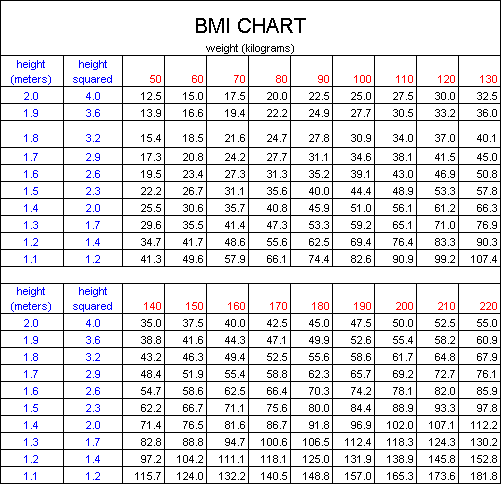Ideal Body Weight: Is There Such A Thing?
Many people often wonder if they are the ideal weight for their height. And when we use the word ‘ideal' we are referring to maintain optimal health. Below we will try and explain about weight, BMI, obesity, etc. And finding out if you're the right weight for your height may not be as easy as you may have thought.
Getting on a scale every morning only tells you your weight-obviously. But, is this information very useful. For most of us it is. But, it needs to be understood that it does not tell the entire picture. For example, it does not tell you your body composition, e.g. what is this weight made of, e.g. muscle, fat, water, bone, etc. And, there are many things that can cause weight fluctuations. For example:
- muscle mass will increase weight, but is not a health problem. So, resistance training may increase weight, but it is because of muscle gain, not fat gain. In fact, muscle (per square inch) weighs more than fat
- water gain/loss will also cause in increase in weight. So, after a long bought of exercise, especially in a hot environment, weight may appear to have decreased. But in fat this is only due to water loss. The opposite is true for people who suffer from water retention
- for women, their monthly cycle may lead to weight fluctuations even though this has nothing to do with fat gain. This is why it is important to weigh yourself e.g. once a month, and on the same day each time. Or, to take an average over several days
- gravitational pulls will also have an effect on your weight (unless you use a scale that is often seen at the doctor's office which is not affected). For example, the same gravitational pulls that cause low and high tides, can also have an effect on how much we weigh on the earth
- time of day will also show different weight. In the morning, before eating, most people are their lightest. So always check your weight at the same time before eating
Body Max Index (BMI) is a measure of a person's weight in relation to a person's height. As you can imagine, taking height into consideration is important, because a person 5 feet tall ‘should' weigh less than someone that is 6 feet tall – all else being equal.
The formula for calculating your BMI is: take your body weight (in kilograms) divided by your height (in meters) squared e.g. 95kg/(1.81m)2 = BMI of 29.
BMI Classified:
- Lower than 18 = underweight
- Between 18-25 = normal weight
- Between 25-30 = overweight
- Between 30-40 = obese
- Greater than 40 = morbidly obese
However, BMI is not always accurate. It does not consider a person's composition. For example, a body builder will have a greater proportion of muscle compared to body fat. But a calculation of their BMI will may classify them as obese because of their weight. Or, someone who has very little muscle may show up with a low BMI even though they have a higher body fat content.
Waste to Hip Ratio is probably more accurate than getting on a scale and BMI at telling you how healthy you are. This is a measurement of your waste (the narrowest point at the waste), a measurement of your hip circumference (at the widest point), then dividing the waste measurement by the hip measurement. The higher the number the more unhealthy a person is.
Example: waist = 40 inches. hips = 30 inches. 40/30 = a W:H of 1.33. The bigger the waist (belly) the higher the number will be.
Belly fat is considered much more unhealthy than fat lower in the body. But the problem with this method is that someone may have huge hips, which indicates obesity, but yet have a low W:H ratio, because the waist is smaller than the hips.
The healthiest ratios are around 0.7 for women and around 0.9 for men.





Leave a Reply